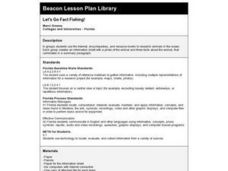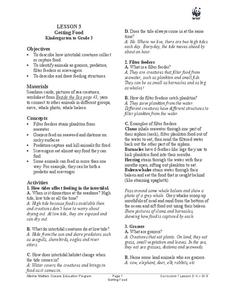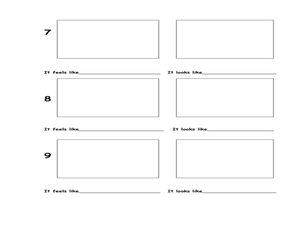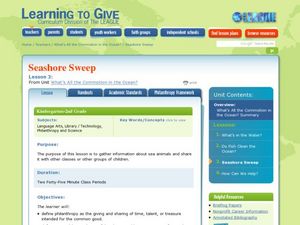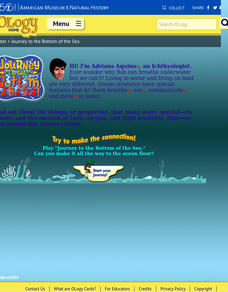Curated OER
Exploring The Oceans
In this science instructional activity, students look for the information in order to answer the basic facts concerning common marine life using puzzles.
Curated OER
Design a Reef!
Students explore coral reef ecosystems. In this ecosystems science instructional activity, students research coral reef ecosystems to determine the major functions the participating organisms must perform. Students construct...
Curated OER
Let's Go Fact Fishing!
Learners work in pairs to research animals in the ocean. They use the Internet, encyclopedias, and resource books to complete an information sheet with a photo of the animal and three facts. They present their mini-reports to the class.
Curated OER
Life Has A History
In this biology activity, students identify and match various classes of species found today. Then they explain why biodiversity exists today on earth and define evolution. Students also describe who a paleontologist is and what they do.
Curated OER
Salmon Homing Instincts
Young scholars identify the stages of the salmon life cycle. In this fish instructional activity, students experience first hand what it would be like to be a returning salmon attempting to identify a home stream by smell.
Curated OER
Getting Food
Students complete activities to learn about the ocean food web. In this ocean life instructional activity, students discuss how the tides affect feeding, learn about filter feeders, grazers, predators, and scavengers. Students then group...
Curated OER
How Big is Big?
The blue whale is the focus of this life science worksheet. Students read an excellent selection on the blue whale, and answer ten comprehension questions. Then, students are divided into two groups. Each group has to estimate how big 85...
Curated OER
Fish Fashion 101
Students explore fish anatomy. For this fish anatomy and adaptation lesson, students define and identify the location of fish body parts. Students add these parts of a fish's anatomy to a life-sized fish costume worn by a student. ...
Curated OER
Helping Right Whales - Right Now
For this whales worksheet, students answer eight questions referring to the right whales found in the Atlantic Ocean. Students read a map to answer three questions and five questions are multiple choice.
Curated OER
Ocean Word and Picture Matching
Students draw a line from 6 ocean animal names to their matching ocean life pictures on the right of the activity. This matching activity allows young students to work on an important visual skill.
Curated OER
Trash Traits: Marine Debris, Litter, Ecology, Oceans
Students perform experiments to examine whether trash can float, blow around, or wash away. The effects of these characteristics on the presence of marine debris in the environment are then discussed.
Curated OER
Exploring Marine Objects
Students identify the sources of water on Earth. In this life science lesson, students list the different plants and animals that live in the ocean. They explore marine objects in the lab and draw them.
Curated OER
Ocean Animals Picture Matching Worksheet
In this picture matching worksheet, students draw lines to match 6 color pictures of common ocean animals to their identical copies in another column.
Curated OER
Ocean Animals Alphabetical Order
In this alphabetical order worksheet, students arrange 8 names of ocean animals in alphabetical order. No two words will begin with the same letter. Note: Each word begins with a capital letter even though they are common nouns.
Curated OER
Seashore Sweep
Students gather information about sea animals. In this ocean lesson, students read a story about the ocean and seashore. They discuss the needs of seashore animals and create a Mystery Ocean Animal riddle book. Students also discuss...
Curated OER
Ocean World
In this online interactive science worksheet, students respond to 7 multiple choice questions regarding icebergs. Students may submit their answers to evaluated.
NOAA
The Biogeochemical Cycle
The biogeochemical cycle ... no physics? The fourth installment of a 23-part NOAA Enrichment in Marine sciences and Oceanography (NEMO) program introduces the biogeochemical cycle by having pupils simulate movement between Earth's...
NOAA
To Explore Strange New Worlds
It's time to boldly go where your class has not gone before! The introductory lesson plan in a five-part series takes young oceanographers aboard the NOAA Ship Okeanos to begin a study of ocean exploration. The lesson plan includes a...
American Museum of Natural History
They Glow!
Would you believe marine animals can make their own light? An online resource describes the process of bioluminescence and how animals in the ocean use it to survive. The lesson features a catchy tune that describes the behavior of ocean...
NOAA
Fishy Deep-sea Designs!
Oceans represent more than 80 percent of all habitats, yet we know less about them than most other habitats on the planet. The instructor introduces the epipelagic, mesopelagic, bathypelagic, twilight, and midnight zones in the ocean....
Teach Engineering
The Great Pacific Garbage Patch
The Great Pacific Garbage Patch is one of several garbage patches around the world where garbage accumulates naturally. As part of a GIS unit that combines oceanography, environmental science, and life science, class members investigate...
American Museum of Natural History
Journey to the Bottom of the Sea
Properties of water make it essential for the life of marine species. Learners complete an online game to answer questions about the role water fulfills for organisms in ocean habitats. The game emphasizes the properties of water and how...
NOAA
History's Thermometers
How is sea coral like a thermometer? Part three of a six-part series from NOAA describes how oceanographers can use coral growth to estimate water temperature over time. Life science pupils manipulate data to determine the age of corals...
NOAA
What's the Difference?
Due to the isolation of seamounts, their biodiversity offers a great deal of information on the development of biological and physical processes. Pupils use simple cluster analysis to rate the similarity and differences in biological...




